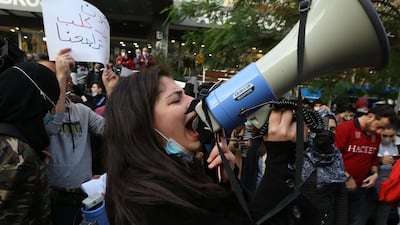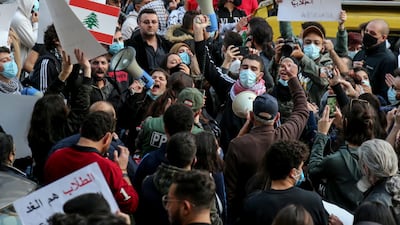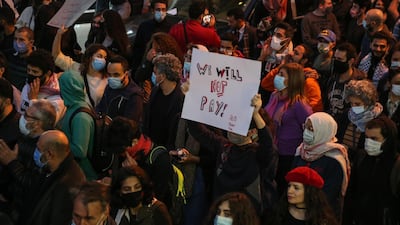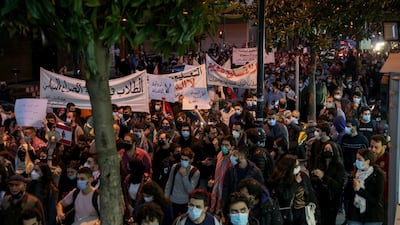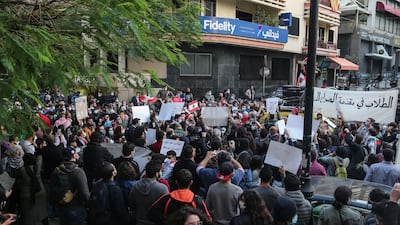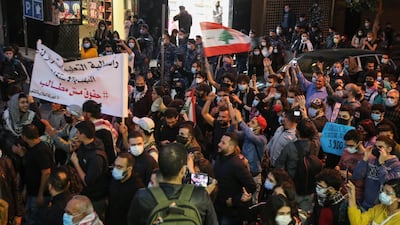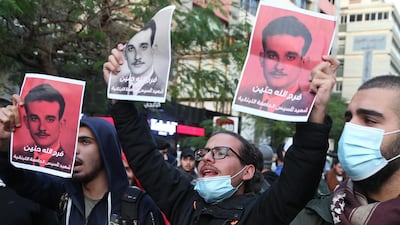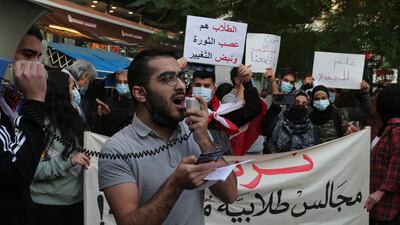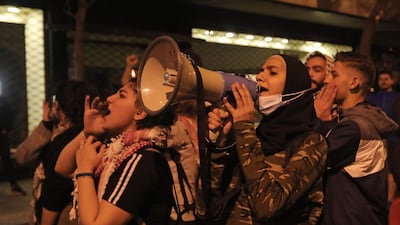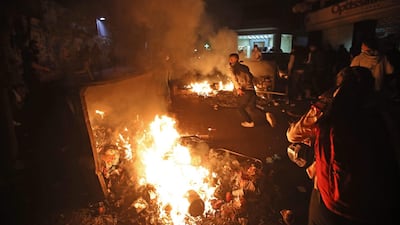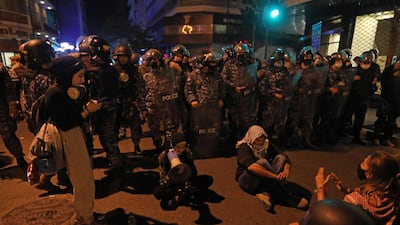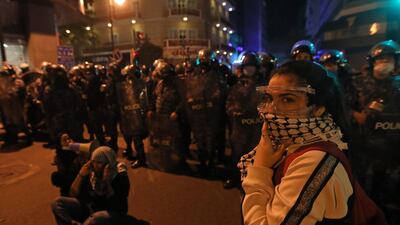On December 19, a large group of students gathered in Beirut's Hamra Street to protest against rising tuition fees, as well as the decision by universities to enforce dollar payments for the fees. This comes amid a severe economic crisis, which has affected all areas of life in Lebanon.
Protesters were from a range of public and private universities. Also present were family members of Lebanese students studying abroad, who are now unable to pay their fees due to restrictions implemented by the country’s banks.
Before this protest, students – particularly the increasing numbers of those who were joining so-called secular and unaffiliated university groups – had been demanding change to the manner in which they paid for their courses. Many of these clubs, emboldened by their victories in annual student elections, decided to take their demands to the streets, knowing well that this could spark a wave of nationwide demonstrations.
The December 19 protest, which involved a march through the university district, soon arrived at the doors of the American University of Beirut, only to be welcomed by teargas canisters and violence at the hands of members of the armed forces. But students persisted and it took security forces more than four hours to stop the riot, during which local banks were attacked and vandalised, rubbish bins were set on fire and roadblocks erected, in scenes reminiscent of the October 17, 2019 revolution.
All this demonstrated the new assertiveness of an increasing number of these secular student groups in the three main private universities in Lebanon, which are now consistently wresting away power from traditional clubs affiliated with the country's political parties.
But this protest was not the first. Earlier that same week, students from the Amal Movement, a political party associated with the country's Shiite community, protested in front of the ministry of education. They were also demonstrating against the enforcement of dollar payment for the fees.
In my years studying journalism at the Lebanese University, I never really heard or thought much about student elections or independent councils. When I was admitted to my faculty, I was told that the Amal Movement’s student council would support me if I was ever in need. When I asked about student elections and how the council had come into existence, it soon became obvious that I had asked the wrong question. There were no elections at my university. Instead, each traditional political party got a stake in the running of faculties assigned to them. In mine, it was Amal.
Such examples of people power in private Lebanese universities give us a condensed example of how the wider national political system works and the resulting predicaments the country faces because of it. With this in mind, it is possible that the current success of secular student groups might translate into a country-wide emergence of new secular parties. These could be the basis for a rejection of Lebanon’s traditional sectarian party system. Their rapid increase in popularity on campuses means it is timely to ask how they might affect the future of all politics in the country.
Change is not expected to take place in the next two years. But in five years’ time, these students might be at a stage when they could transfer the momentum that the secular parties have on campuses to the arena of national politics, possibly even winning elections.
When I talk to students about this, they routinely say the same thing: that their efforts on campus today are primarily to prepare them for the bigger battle of taking on corrupt parties at the national level. So do they consider this to be good practice? “Of course, it is,” one student tells me, “we now know how to advocate, debunk fake news and combat misinformation intentionally spread about us. Imagine what we can do in five years?”
During a roundtable discussion on the topic "Youth and Politics: Between isolation and partisan drift", held by Beirut’s Saint Joseph University in October 2016, Essam Khalifa, the former president of the Association of Full-Time Professors at the Lebanese University, talked about how young people should take the lead in the push to reform politics.
Professor Khalifa, who provided an overview of his struggle at the Lebanese University in the 1970s, predicted back then the protests that were to arrive a few years later. He also said that the primary issue that motivated students to demonstrate and engage in civil disobedience in the 70s pertained to their graduation prospects, which were at the time being undermined by the ongoing civil war. Students were also dissatisfied at their inability to participate in the administration of universities.
Among the means used by Professor Khalifa and his companions to champion their cause was to publish a magazine called Al Wai or "Awareness". It was launched specifically to spread their ideas and demands. It eventually became an important part of the "awareness movement", which at that time topped the headlines in a number of local newspapers, given that its demands resonated with the masses on a national level. The movement was characterised by large demonstrations for a sustained period of time. Protests were held at Nejmeh Square, often to disrupt parliament sessions, as well as in politically sensitive areas, such as Airport Road, Hamra Street and Martyrs Square. As such, there are many parallels with today's demonstrations.
The 70s movement was not supported by any of the mainstream political figures. It even endured its fair share of attempts to repress it. And yet, it succeeded in ushering in meaningful change – including an amendment to laws regarding student participation in the administration of the Lebanese University.
One reason for the student groups' success was that they enjoyed good relations with members of the faculty across the board. The situation today, however, is different. Favouritism and nepotism are so entrenched that any action taken by students is bound to receive scrutiny from some of their professors. And in some universities, how they are graded could even depend on their politics.
Which is precisely why, in order to bring about change, taking to the streets might be the only option left for them.
Luna Safwan is a Lebanese freelance journalist who works on press freedom



















